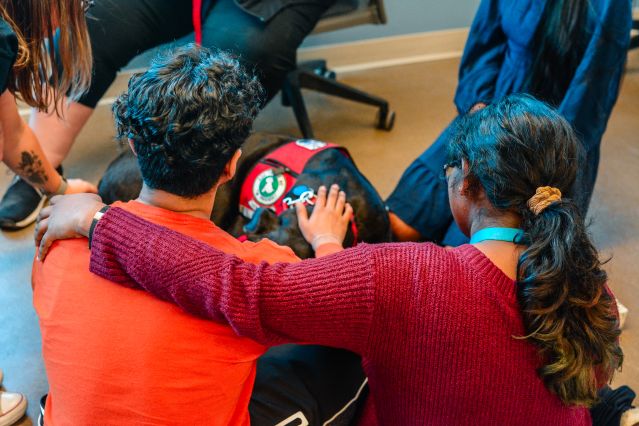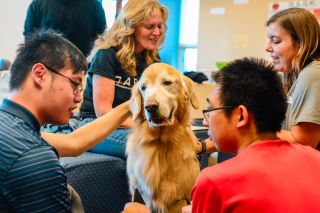Therapy
Feeling Lonely on a Crowded Campus? Therapy Dogs Can Help
On-campus therapy dog stress-reduction programs help connect students.
Posted September 30, 2023 Reviewed by Tyler Woods
Key points
- Despite opportunities to meet others, college students experience high rates of loneliness.
- Therapy dog stress-reduction programs can reduce on-campus loneliness.
- Therapy dogs are social catalysts who connect students.

As the director of a large on-campus therapy dog program to reduce students' stress, I routinely hear, "As much as I miss my parents, I miss my dog more."
A lot is asked of students as they adjust to life on campus, and leaving behind the support and companionship of family pets can add to students feeling lonely. When students share with me that they're feeling lonely, I often tell them that the student next to them is very likely feeling the same way. In this entry, I'll argue (and have seen ample evidence) that on-campus therapy dog stress-reduction programs can serve to foster connections for students.
It’s paradoxical that students on college campuses report high rates of loneliness in light of the many opportunities they have to meet new people and forge social connections. Nevertheless, students aged 15-24 report high rates of “always or often feeling alone." College students, in particular, can experience heightened loneliness (a feeling describing the distress felt when one’s desire for social connection outweighs one’s actual social connections), and researchers have posited that the transition from home to campus, the change in parental support, and the establishing of new social support networks contributes to feelings of loneliness.
Loneliness has been found to compromise people’s physical and mental health, and not surprisingly, lonely students are at risk of underperforming academically. In short, feeling lonely on campus can undermine students’ learning and engagement in campus life and activities. Complicating matters, college students are known to be reluctant to seek help, often preferring to eschew more formal resources or sources of support to handle their mental health challenges on their own.

One low-cost and low-barrier (i.e., no appointment needed) resource found on many college campuses that appeals to students is the stress-reduction programs that see therapy dogs brought to campuses. Known as “canine-assisted interventions” or “canine visitation programs,” such programs provide students opportunities to spend time with therapy dogs and their handlers, de-stress, and connect with other students.
Animals, in general, and therapy dogs in particular, are known to be social catalysts—they bring people together who might not otherwise cross paths. Moreover, within the context of on-campus canine stress-reduction programs, the dogs do all of the heavy lifting—they draw students in and invite the students to interact. A skilled handler (the person who oversees such interactions and safeguards their dog’s welfare during sessions) will facilitate students connecting with other students. In the B.A.R.K. program at the University of British Columbia (UBC), handlers routinely ask students about their adjustment to campus, the courses they're taking, and introduce students to others within their group. Repeat visits to such programs can result in students feeling a sense of community and building their social capital by establishing connections to others.
If you’re reading this and you’re a student who’s feeling lonely, consider attending one of the dog-therapy stress-reduction sessions offered at your college. Make use of your on-campus resources, including the college's therapy dog program, and let the dog do the heavy lifting to connect you to others.
References
Binfet, J. T., Green, F. L. L., & Draper, Z. A. (2022). The importance of client-canine contact in canine-assisted interventions: A randomized controlled trial. Anthrozoos, 35(1), 1–22. https://doi.org/10.1080/08927936.2021.1944558
Green, F. L. L. & Binfet, J. T. (2023). Beyond cuddling canines: Exploring students’ perceptions of an on-campus canine-assisted intervention. Emerging Adulthood, 11(5), 1238-1254. https://doi.org.10.1177/21676968231188754
Tardif-Williams, C. Y., Binfet, J. T., Green, F. L. L., Roma, R. P. S., Singal, A., Rousseau, C. X., & Godard, R. J. (2023). When therapy dogs provide virtual comfort: Exploring university students’ insights and perspectives. People and Animals: The International Journal of Research and Practice, 6(1), 1–17. https://docs.lib.purdue.edu/paij/vol6/iss1/5


